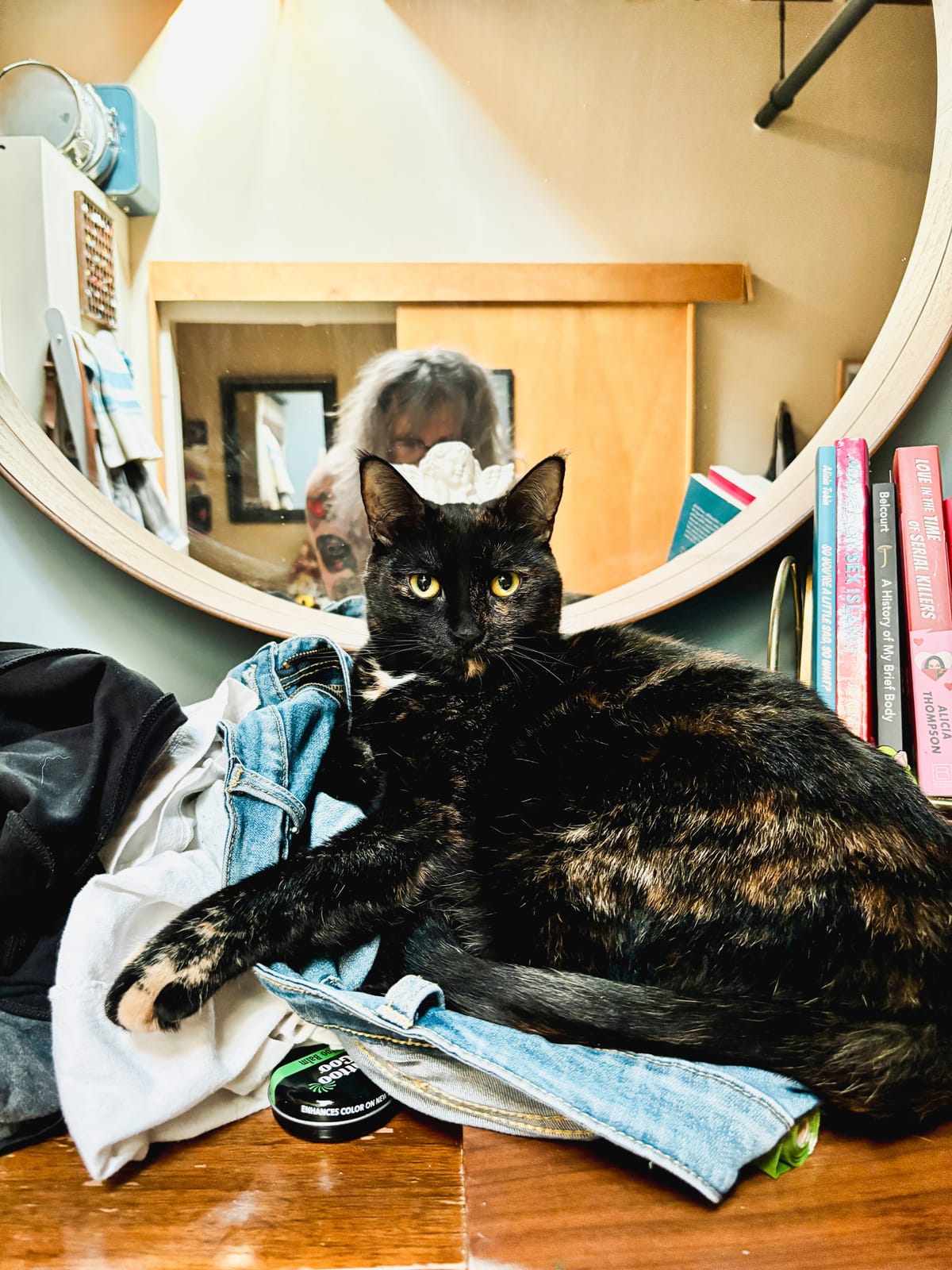The promise of oxygen

“I’m a random bitch, and you’re a random bitch, just think about that for a second”.
I’ve been thinking about this line a lot this week, delivered by Chappel Roan into the front-facing camera sitting comfortably in front of an off-white wall. It’s the tail end of a minute-ish long video on TikTok, an app I never use but always tell myself this is the week I'll get into TikTok. I sometimes think I’m far too 42 years old to get into TikTok, but that could just be exhaustion at all of this.
That kind of exhaustion feels shared in Roan’s video. I was a panelist on Commotion with Elamin Abdelmahmoud this week talking about this video – joined by the New Yorkers Tyler Foggatt and musician/writer Eliza McLamb – talking about Roan’s pushing back on the intensity of fandom and stan culture and an eternally online pyramid scheme artists are increasingly encouraged to lose themselves to. This is the price of fame, they’re told over and over again by the gathered masses of the most normal denizens of the internet's eternal city. You’re famous because we made you, and you owe us your time and energy and personhood. Give us your authentic self in photos on demand, your voice on and off the stage, your spirit and soul and the blood of your blood and in return your Spotify numbers will rise to meet the heavens.
This is what is required of an artist to be successful. I see this sentiment written in snarky replies and long threads that peel away the flesh of the artists that everyone claims to love, even as they strip them of just one more layer. This is love. This is success. We made this, and we claim it.
This isn't even a new idea. Fans have traditionally, famously, lost their shit in the name of artists they love. When young women fell in love with the Beatles, they fawned and swooned, stormed the stage when they could, mobbed Ringo’s drum kit. Started a rumor that Paul was dead. The walrus was Paul, etc. People love when they feel seen and heard and loved in the voice of an idol and it’s easy to see where these kinds of parasocial relationships come from. These kinds of intense fandoms are often built from audiences that haven’t always been seen as the dominant environment. Often they are young women, and/or queer people, and/or people of color that build communities around shared desires and interests. This is the beautiful thing about art and culture and all things, that it creates lifelines that tether all of these people together and gives them fertile soil on which to grow and blossom.
It’s only just that it can grow these weeds of great intensity. Stan culture is a term cribbed from an Eminem song, “Stan”, where a guy who loves Slim Shady so much holds his pregnant girlfriend hostage in the back of his car, writes a series of increasingly angry and obsessive letters to his idol before killing himself, his girlfriend and their unborn child. Sometimes this fact goes unspoken when people refer to themselves as Stans, as so many uncomfortable facts often do. To be a stan is to cross boundaries and barriers and create a new place for yourself in proximity to the artist you profess to love, because no one understands them like [ARTIST] does and only they know how [ARTIST] feels and why can’t they see that, why doesn’t anyone understand how well you know what they are thinking and feeling and saying. Stans have studied every careful word uttered into a front-facing camera and every tightly edited Instagram caption and they know the intention and desire hidden there for them to see.
It’s intense, and artists are told this is the price of fame, this is part of the job to deal with this kind of shit. This is success. Maybe this is a matter of etymology. I grew up in a working class house, my dad works as a Glazier, the trade he learned from his father and the trade that I learned from him. My mom worked odd jobs and retail before she wasn’t healthy enough to work full time. We are working class, blue color, however you want to frame it. This is the life that I know. My dad just turned 70, and he still works as a glazier. A job he is exceptionally skilled at, hard work he is proud of. They own their home, they have a car, food in the fridge, money in a savings account. They are successful.
I grew up thinking a successful career meant something very different. Success meant that you were able to support yourself, that you’re able to keep going. That there is comfort, that work is sometimes hard, and that it can sometimes break you, but that it sustains you. No one dreams of labor, but labor is required all the same. I have worked since I was 13 years old, almost three decades ago now, and I’ve been fortunate to learn skills and trades and have opportunities despite never having a good education to speak of, and when I became a writer, I worked very hard to achieve what I can consider success. It often pays the bills, with side hustles that help generously, and while the work can sometimes be hard and it can sometimes break me, it sustains me all the same. I have a successful career because there is sustenance to be found within it.
I think about Chappell Roan’s video and I think about the response to it, many of whom are names in a void lambasting her for not being grateful for the success that she’s found. That if she wants to truly be considered a success as an artist she will smile when asked and pose when asked and allow her flesh to be removed when desired and be thankful for it. That success means something immutable, something unattainable, a water line promising oxygen that few can swim to. Success that means domination and subjugation all at once.
Just last month in Vox, a headline read “Why are so many female pop stars flopping?”, which used the Billboard Hot 100 as a metric of women's success in pop music. It positions the idea that male pop stars are never required to perform the same tricks as any other gender, no eras tour or carefully crafted brands on them before it goes on to lament that despite women being all over the Hot 100, that they are somehow in their flop era. Which runs counter to this idea that men don’t need to create anything to be successful, they just are, but women are always required to be more in order to be considered anything but failures. Despite the fact that women are omnipresent in a variety of genres and Hot 100 positions, they are still somehow less than because they are not wholly and entirely perfect.
You can say that this is the hard part of the labor in making pop music but that isn’t true. The labor is in creation, the labor is the crafting of melody, lyrics and rhythm and stage production. Costumes, movement, brands, eras. This is the work, and I’m sure it is sometimes hard, but I have to assume it is often rewarding and cathartic and beautiful. It’s hard work that not everyone can do, the same of all labor. Chappel Roan is already a success because she has made a career out of the work that allows her to keep moving, to grow, to support and sustain herself. This is a hard and challenging job in its own right.
We don’t hear from Mitski anymore for this exact reason.
In a Twitter thread in 2019, Mitski wrote “I don't even seem to matter in the equation”, after endless discourse broke out regarding her and Mac DeMarco having similarly titled records. She quit the internet around the same time, a former hall of fame poster who decided she had enough of the cycle that was starting to hurt more than it healed. In Rolling Stone she talked about this same kind of de-personification that happens in the music industry.
“I felt it was shaving away my soul little by little,” she says. “The music industry is this supersaturated version of consumerism. You are the product being consumed, bought, and sold. Even the people on your team who are your friends, the very foundation of your dynamic is that they get a percentage of your income. Every time I turned something down, it would mean that they would make less money.”
And this is where, I hope, we can continue to have conversations on what we have asked of pop stars and artists, the people we claim to love and hold deference to. That we have made success for them to mean something more. We have made it the water line, the promise of oxygen. Success is only when you reach the top, and if you want to swim to it, the price is grave. It is stripping of the flesh and giving of blood until you reach the air. Success measured only in how many breaths you can take before you sink just below the surface once more.
—
Okay, let's also talk about some records I have been listening to. I’m very much in the final run of book hell, which leads to the inconsistent nature of newslettering. I’m sorry! My health has also been on and off not the best, and sometimes it just is what it is. I also have not been listening to much outside of music that features in the book, or the soundtrack to Stardew Valley. But, all the same, here’s some recommends:
A new record from Spring Silver, Do You Think it’s Strange, drops today and it’s been the little uplifter I turn to in times of need and desire since it arrived in my inbox. Like a dance punk record played loud at 3 am, like a perfect cigarette on a patio in the hours between day and night, like feet moving well before your heart knows you’re dancing. It’s a swift record, 8 tracks over 41 minutes, but it’s a joyous journey through textures and shades of perfect memories, each song like moving through a waking dream. It’s a beautiful exercise in rhythm and movement, the perfect soundtrack to the end of the summer as we hold onto each day as if they might be the last.
I’ve been playing the hell out of the two tracks available from the upcoming record Merce Lemon album, Watch Me Drive Them Dogs Wild, especially at night as I walk Bowie up the street and let myself breathe all the air I've been holding in all day as I move through challenging and long days. An album that plays well with the urgent whine of cicadas in the ether, songs that feel like the heat of the summer air in contrast to air conditioning inside. I’ve been unaware of Merce Lemon until now, Matt Mitchell wrote a lovely piece in Paste on her and this is the beauty of being alive despite the aches in my bones and the pain in my chest is that there is always something new to discover.
If you've been waiting to grab a copy of 2 Trans 2 Furious, the all-trans book about the Fast and the Furious that Tuck Woodstock and I co-edited (which also won a Lambda Award! read about it in Vogue!), it's been repressed under our newly formed publishing label Girl Dad Press!
This time, you can actually buy it online and in book stores! So please, order from your local shop OR online:
Canada: https://alllitup.ca/books/2-trans-2-furious/
America: https://www.akpress.org/2-trans-2-furious.html
or
Big Cartel: https://2trans2furious.bigcartel.com/





